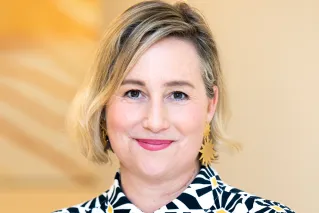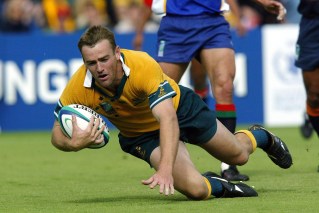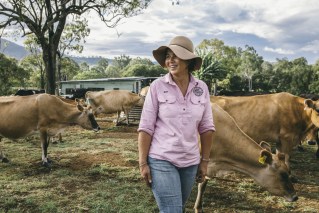Book extract: Ben Hobson’s novel The Death of John Lacey
In today’s summer reading extract, Brisbane based teacher and author Ben Hobson takes us back to the 1800’s in a searing Australian western set in the goldfields of Ballarat, where John Lacey’s lust for power and gold brings him riches and influence beyond his wildest dreams … only he knows the terrible crime he committed to attain it.

In the end he was alone. It was musty and dark in the earth. The taste of iron, dirt in the mouth. A struggle to breathe, his bad leg groaning like he was decades younger and the injury was fresh again. His chest throbbing gunshot blood, the backs of his legs leaking.
He had always known it would be this way. Deep in the bloodied ground he’d made his name on. The boy he’d murdered reborn, he knew that now. Mongrel little shit. Conspiring with the spirits, all of them bent against him. The boy manifest in every circum- stance. All people. His rotten luck not born of chance but born of the decision he’d made all those years ago.
He did not regret he had killed the boy. He regretted only he had not killed him so hard he had stayed proper dead.
1847 Ernst James Montague and Joe Montague
EDWIN MONTAGUE was indicted for stealing, on the 4th of August, 1835, at St Leonard, Shoreditch, 6 sovereigns; 9 half-crowns; 1 shilling; and 1 box, value 1 penny; the goods and monies of William Bennet, in his dwelling-house.
JANE BENNET. I am the wife of William Bennet, and live in the parish of St Leonard, Shoreditch—we let lodgings—the prisoner came to me on Thursday, the 30th of July, from the fever hospital, and asked me to accommodate him for a week, till he could write home to his mother for money to take him home—I consented, and on the 4th of August, at half past nine o’clock in the morning, I put the money, named in the indictment, into a box, in a handkerchief— the prisoner was not there then—he had been ill all night, and I had been up with him—I went out of his room, and received the remainder of my money to make up my rent from the other lodgers—I was not more than five minutes out of his room—when I returned, I missed him—I opened my drawers to take the money out, and missed it—it was in the second-floor room—I ran down stairs and made inquiry of him; he was not there—I afterwards saw part of the box in which the money was deposited—nobody but him could have taken it, they had no time—I lost 6 sovereigns; 9 half-crowns; 1 shilling.
WILLIAM STOTTER. I am a policeman. I received information of this, and went in search of the prisoner—on Monday, the 4th of August, about half-past seven o’clock in the evening, I found him in the Red Rover, Manchester coach, at the Angel, where he had booked his place for Birmingham—I took him out of the coach, and told him it was a bad job—he said it was, if they could prove it against him—at the watch-house I found 4 sovereigns; 5 half-crowns and 4 pennies, and part of the box on him—I found a purse with the silver and halfpence on him—the four sovereigns were in the box.
EDWIN MONTAGUE. The sovereigns were in the purse when the officer found it—he put the sovereigns into the box and the silver in the purse.
GUILTY. Aged 18.—Transported for Life.
In all his young life Ernst had only known their farm. His mother would often tell him stories about the life she had led back in Scotland but all Ernst could do was nod, hoping his mother wouldn’t notice he didn’t share her longing. They had come so far inland when they’d first settled on their land that Ernst had never even seen the ocean; he had been just a babe when they’d made the journey. His mother promised him they’d go and see it as she swept her hand in front of her, bidding his eyes follow her gaze to her imagined waves, the sloshing blue she painted for him with her words.
We’ll travel back that way some day, and you’ll see it, she’d say.
We’ll travel over it, back home.
He’d nod and smile. It’s so dark, the blue.
He’d nestle into her and try to tell her with his body they were home already; there wasn’t any need for them to leave. But she was a hungry bird, never satisfied with the feed right in front of her. He knew it had been something for his father to earn his ticket and travel over from Van Diemen’s Land with his young family, find the small township of Bannockburn, and build this new house for them all. His mother, though, would quietly grumble when she thought he couldn’t hear, about the small size of the home, the large distance from the town, or the poor quality of the build, running her hands over the rough wood, latching the door closed with rope and nails, whispering about the need for a handle. But Ernst admired that his father had made anything at all. She was a slight woman, blond hair clutched tight to her skull with a comb. She would look out the window as she spoke of the ocean or she would look at the painting of the hills of Scotland his father had hung above the fireplace and her eyes would go distant like she had drowned in her memory. For the remainder of the day she would not be wrenched out until his father returned.
His father worked their fields late into the evening and would arrive home after they’d already eaten, smelling of sweat and dirt. He was a large man with furry arms and a heavy red beard. His words sounded like music when he spoke, like in him was some permanent song. He had a deep voice. He was stout, his stomach built of brick. Before entering the house he would wash up in the trough outside and then sit at the table and ask them both about their days as he ate, his hair still dripping with water.
Nothing much for us to do around here, Ed, Ernst’s mother said one night. She had her arms folded and was seated at the opposite end of the table to his father.
I know, his father said. He spooned in some thick mutton stew and it clung to his moustache. You should take Ernst up to see that other boy. You get on and see the woman. What’s her name?
You know we can’t. It’s too far.
His father licked his lips and spooned in another mouthful.
I’ll take you, then.
We’ll all ride the horse together? All three of us? You could sit in the back of the cart. I’m not sitting in the back of the cart. Isabelle.
She had this way about her that suggested her anger without her putting word to it. The hurried way she’d stride from a room or sit down and sigh. Or the way her fingers would clutch the fabric of her dress at her knees, scrunching it up tight, digging her nails in. Later, in bed, he could hear them both still talking. Their small home only had one room, and at night his father draped a quilt, made up of sewn-together old burlap sacks that had originally held potatoes, over a rope he’d strung up after Ernst’s mother had been at him about the lack of privacy. Then Ernst could no longer see them—just their shadows silhouetted behind the cloth. His mother would snuff the lantern before she undressed and it would not be lighted again until the following evening.
They talked a long time but he could not hear exactly what was said, since neither raised their voice for fear of waking him. Still, he could tell that in their whispers was all the disappointment they always strived to keep from him.
He woke in the early light of dawn to shouting from outside. He wiped the sleep from his eyes and sat up. From behind the hanging quilt he saw his mother yelling from the doorway. She was clutch- ing the frame with one hand. He looked for his father but couldn’t see him.
He went to the door. In the yard was a group of black men and women, at least ten of them; the women had possum skins draped over their shoulders and the men wore nothing at all. Ernst tried not to look at their bodies. Behind them, children were staring with wide eyes, probably at him, and around their feet four dogs circled. Though their shapes were hard to make out in the early light, they appeared mangy and scary.
Ma? he said.
Go find your da. Where is he?
A shout from the crowd. Their throats caught on their words in ways Ernst didn’t understand.
What’s bacca, Ma?
It’s tobacco, she said. Addressing the Aboriginals, she said, I told you we don’t have none. Then she shouted, Ed! Ed!
The men and women in the yard seemed unmoved by this. They just kept watching Ernst and his mother, laughing with each other.
He had heard the stories his mother and father told while they thought he was out of earshot. They spoke of people being speared, of men and women and children being killed in their sleep, the blacks ghost-silent in the night as they crept into the homes. Ernst understood death. He had seen it many times when his father killed a sheep for them to eat. It would kick its legs for a bit but soon stop, and then his father would string it up and butcher it, his hands turning red and the front of his shirt darkening. He understood too that getting stuck in the guts with a spear would be painful. He didn’t want to be dead, for his legs to stop moving. The blacks in the yard didn’t appear to be holding weapons, but he knew from how his parents spoke about them that they would still be capable of harm.
His father rounded the corner of their home with his temper up. In his hands was his musket; he had it angled down but it was there so the blacks could see it. He stood in front of Ernst and his mother in the doorway, shielding them with his body.
You alright there, Iz? he asked without turning his head.
No, I’m not alright. These ones come up asking for our goods.
Ernst’s father raised his voice to the crowd in the yard. What’re you all up to?
Ed! the one in front shouted. He was smiling. Ed! This is your house?
What do you want? his father responded.
The man held out his hands like he wanted a present. You got bacca? We need some.
No, we don’t have none.
You got needle? You got thread? You got tea? Hold up there, his father said.
You got sugar? Still with his hands out.
Ernst’s father turned to his wife who was still gripping the door- frame. Go get the sugar and tea.
You’re not giving it to them? I’ll give ’em some.
Ernst could see the anger in his mother’s clenched jaw. She stomped from them and he watched her grab a handful of sugar from the bag near their food stores in the corner and fling it into a smaller jar. She did the same with the tea and brought it all to his father, who lay the musket down on the verandah and took a jar in each hand. Then he walked slowly out to the black and said, Here you are.
The black man’s grin widened as he took the jars. He gave one to a small child who ran away with it. Then the whole lot of them turned as one and ambled back to the tree line without hurry.
Didn’t even say thanks, Ernst’s mother said as his father returned to them.
Edwin leaned down and retrieved the musket. He hefted it and ran a hand along its metal. They probably just expect it like it’s nothing. Like it’s rent.
This place ain’t theirs.
Ernst’s father said, I know it’s not theirs. It’s mine. But it is better to keep them friendly.
How long do they expect to keep that up? His father shrugged. As long as we’re here. And what if we can’t pay?
I don’t know, Isabelle. They’ll spear us to death and eat our guts. She said nothing. Then, That first one knew your name.
I’ve given them things before. I met ’em out in the bush.
Given what?
Sugar. Small stuff they don’t have none of.
Well that’s bloody it, then. You’ve as good as told ’em they can expect it from us. They’ll be back here every day now.
Enough, Iz.
His mother opened her mouth to speak but saw her young son looking at her and shut her mouth and smiled and walked back into the house instead. His father didn’t watch her go. He was watching the tree line.
Edited extract from THE DEATH OF JOHN LACEY by Ben Hobson, published by Allen & Unwin, January 31, RRP $36.99.












